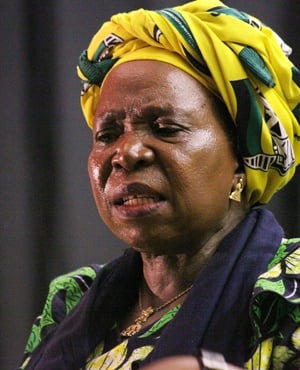
Never let a good crisis go to waste, Sir Winston Churchill may, or may not, have said. Many politicians and economists are now taking that advice anyway, capitalising on the Covid-19 crisis, to advance their own agendas or justify their pet theories.
In South Africa, for instance, the minister of cooperative governance and traditional affairs, Nkosazana Dlamini-Zuma, a strong anti-smoker, seems controversially to have browbeaten President Cyril Ramaphosa into reversing policy and imposing a ban on tobacco and cigarette sales during the lockdown.
The minister of trade and industry, Ebrahim Patel, likewise banned e-commerce partly because of "the impact on other businesses." So Patel, a communist, is clearly using the regulations to try to effect fairness among businesses. Neither of these policies have much to do with curbing Covid-19.
At the other end of the Cabinet’s ideological spectrum, finance minister Tito Mboweni is evidently trying to use the Covid-19 crisis to force through some long-thwarted reforms like grounding SA Airways and slashing the public service wage bill.
Globally, though, it’s more the left than the right that is seizing the opportunity. Not surprisingly perhaps, since the economic fallout from all the travel restrictions and lockdowns, airlines going bust and countries turning inward certainly looks like evidence that the era of globalisation, of market rule and liberalism has ended, as John Gray essentially concludes in a much-read essay in New Statesman.
He revels in the way that the nation state, in Britain, as elsewhere, has reasserted itself, stepping into the breach to save health systems and economies, while multinational institutions such as the EU – and one could add for good measure, the United Nations Security Council – have dismally failed.
He envisions the new nation state henceforth being far more self-sufficient and feeding itself, for example, rather than importing its food. Where does this all leave Africa? Not in a good place. First of all, Africa faces graver economic peril than most. The IMF predicts that the global economy could shrink by 3%.
The World Bank forecasts that Africa’s economy could contract further, by as much as 5.1% in 2020, mainly due to a sharp decline in commodity exports to key trading partners such as China and Europe, as well as a steep fall in commodity prices, led by oil, a plunge in tourism and remittances as well as the domestic impact of lockdown measures.
“I think African economies are indeed in danger of suffering a fatal crash,” Carlos Lopes, former head of the UN Economic Commission for Africa, told New African in late April. To prevent that crash, the African Union has asked the international community for at least $100bn to defeat Covid-19 and keep economies afloat.
The World Bank has estimated Africa needs more, about $114bn. It says official creditors have so far mobilised up to $57bn for Africa in 2020 – including upwards of $18bn each from the IMF and the World Bank.
Private creditor support this year could amount to an estimated $13bn. That leaves a financing gap of around $44bn. But Lopes himself told La Tribune Afrique that Africa needs at least $200bn to beat Covid-19 and the economic fallout from it. And only the IMF could provide it, in the form of special drawing rights.
If this huge rescue package is somehow forthcoming and Africa does survive Covid-19, where will it then be? Firmly in the hands of governments, Lopes, like Gray, seems to believe. The two share just a whiff of the same schadenfreude over the apparent collapse of global capitalism which Covid-19 seems to have precipitated.
But whether a return to economic nationalism and state centrism can work anywhere, even in rich states like Britain, is doubtful. That it can work in Africa seems very unlikely – and not necessarily a good thing anyway. African governments have not all shown themselves to great advantage, many clearly exploiting the crisis to wield the big stick or dodge elections to cling to power.
Yes, it is true now that Africa should become more self-sufficient – as in producing enough to cover its costs. But it surely doesn’t make sense to lament, as some economists are, that Africa should itself have already been producing all the medical equipment it would need to fight Covid-19. Who could have anticipated suddenly needing trillions of masks?
Africa should no doubt capitalise on the global reaction against “one-country risk” (especially to China) in global supply chains and so boost its manufacturing, as the Brenthurst Foundation suggests in an article in Daily Maverick in early May.
But, of course, diversification – especially away from the continent’s long and fatal dependence on single commodity exports – has always been what Africa should have been doing anyway. Nothing has really changed.
If we take some of the apocalyptic arguments we are now hearing to their logical conclusion, our benevolent governments should now be giving us all a few chickens and perhaps a cow and some vegetable seeds to replace our roses so we can feed ourselves in our own homes in this post-pandemic, post-globalisation world.
For it is not just the global economy that has been dislocated by the coronavirus. It is just as much, or probably more, national economies and supply chains that have been disrupted. There is much we don’t yet know about the coronavirus, but one thing we can be fairly certain about is that it does not have any ideological disposition.
But the danger is that many of these ideological forecasts that are being made as though they are objective visions of the future, will become self-fulfilling and will drag Africa and the rest of the world back into a protectionist past, which will only aggravate the economic crisis.
This article originally appeared in the 21 May edition of finweek. Buy and download the magazine here or subscribe to our newsletter here.



 Publications
Publications
 Partners
Partners











